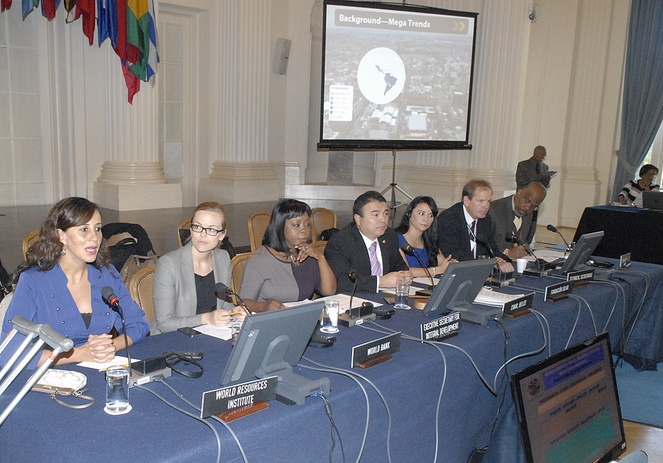

The cities of the Americas are experiencing dramatic changes derived from rising urbanization. Numerous cities are rapidly expanding beyond their planned limits, and the systems to provide them with water, sewerage, waste disposal, and other common services are becoming obsolete, inadequate and inefficient. These issues must be addressed insofar as cities are responsible for as much as 80 percent of global greenhouse gas emissions.
On October 29, 2013 the Executive Secretariat for Integral Development of the Organization of American States (SEDI/OAS) convened an expert panel in Washington, DC, to discuss the effects of rapid urbanization on infrastructure, housing, common spaces, transportation, pollution, waste, and consumption. The discussion panel presented the current situation of the region, major challenges posed by urbanization, and best practices and efforts to build more sustainable cities. The experts agreed in that the cities of the Americas must adopt more sustainable management strategies in order to foster greater economic and social development and protect the environment. Richard Huber, of the Department of Sustainable Development of the Organization of American States, stated “A sustainable city is one that fosters high standards of living for its residents while ensuring that future generations may enjoy higher standards. Rational energy and water use, as well as efficient transportation and low carbon emissions are some of the core tenets inspiring the design of these cities.”
The Sustainable Cities in the Americas ECPA initiative comprises a Plan of Action focused on economic development, housing, pollution prevention, environmental protection and sustainable transport. In response to these priorities, the cities participating in this initiative are deploying new policies with an emphasis on public transport, cycling and walking, sustainable urban development, waste management, climate, energy and transport, traffic reduction, and outreach and awareness. Cities such as Curitiba, in Brazil’s Paraná state, Portland, Oregon in the United States, and Medellín, Colombia are some examples of cities on a path toward greater sustainability and eco-efficiency. “Growing environmental awareness, matched with a sense of city ownership and pride, are helping these cities thrive”, said Huber.
 View Map
View Map